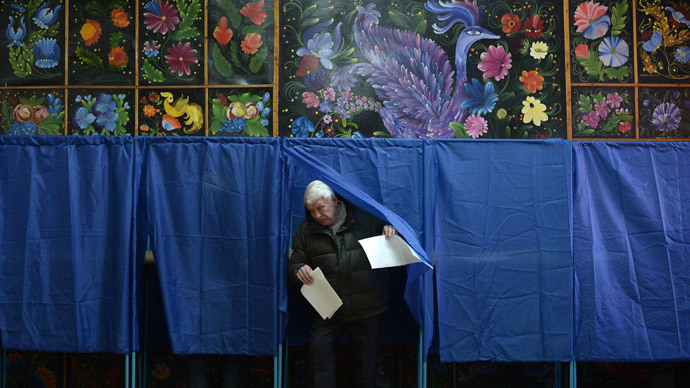‘Moscow-Kiev dialogue won’t be easier after Ukrainian vote’

The Ukrainian parliamentary elections will not make relations between Ukraine and Russia any easier since so-called “hawks” came to power in Kiev, political analyst Dmitry Babich told RT.
RT:What direction is the Ukrainian parliament going to take the country in now, after the recent elections?
Dmitry Babich: It is clear that Ukraine will be a smaller and more nationalist country with this new Parliament. That is a sad reality because it is in Russia’s interest, it is in the interest of the European Union, and in the interest of the world that Ukraine should be a united and democratic state. Unfortunately this was made impossible by the coup which happened in February and which ousted the former President Yanukovich by violent means. Now of course the Western media is spreading two lies. The first lie is that since the Right Sector and the Svoboda, former national socialists, didn’t get into the parliament and it means there are no extremist nationalists in this new Ukrainian parliament. That is not true: there are many people with Nazi views who are represented in the party of Prime Minister Yatsenyuk, in the party of President Poroshenko and also in the Batkivshchyna Party, and in the radical party - basically, in all the factions except the opposition. The second lie which the Western media are spreading is that people in the East didn’t vote because part of the East is controlled by the rebels from the Donetsk and Lugansk [self-proclaimed] People’s Republics. Again, this is not true because in the areas of Donetsk and Lugansk regions - which are controlled by the Ukrainian army - the turnout was below 30%. It means that people there feel occupied; they don’t feel that this is their election; they don’t want to live in the state where their rights are not represented in the parliament.
READ ALSO:Russia ready to recognize Ukraine parliament election - Lavrov
RT:Ukraine-Russia relations have hit a rough patch since the elected president was deposed last February. Russia's Foreign Minister Sergey Lavrov said that Russia will have someone to talk to in the Ukrainian government. In your opinion, how will relations between two countries are affected by this election?
DB: It’s clear that the so-called “party of war” came first in this election and this is one of the reasons why I don’t consider this election democratic and a lot of people in Ukraine do not consider it democratic. The party of Prime Minister Yatsenyuk is largely seen as the most anti-Russian force in the Ukrainian politics. It may only be behind Svoboda, formally the National Socialist Party of Ukraine. When Minister Lavrov says: “We will find someone to talk to in the Ukrainian parliament,” I think he wants to sound pacifying. He hopes that there will be a dialog at some moment. But this election will not make this dialogue easier; it will certainly make it more difficult because the so-called “hawks” came into the Ukrainian parliament.
The statements, views and opinions expressed in this column are solely those of the author and do not necessarily represent those of RT.
The statements, views and opinions expressed in this column are solely those of the author and do not necessarily represent those of RT.












